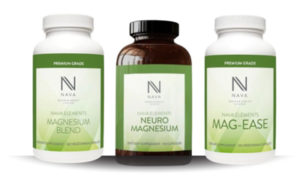You may have read that the global prevalence of dementia is on the rise – and also wondered about the health benefits of magnesium supplements. No one wants to extend their life just to spend it in poor health.
The truth is we can expect the number of people suffering dementia to rise from 57.4 million in 2019 to 152.8 million by 2050. That’s why scientists have focused research on magnesium supplements as a potential factor in both treating and preventing cognitive decline.
It’s worrying to think there’s currently no cure for dementia and that there’s been limited success in pharmacological treatments. Preventive measures such as magnesium supplementation therefore seem a great idea to protect your ongoing brain health.
So, in this article we’ll look at:
- The link between magnesium and cognitive health
- Benefits of magnesium supplements
- Magnesium for healthy longevity
- Foods high in magnesium
The Impact of Magnesium Intake on Cognitive Wellbeing
Researchers from the Australian National University investigated the relationship between dietary magnesium intake and brain health in a study involving 6,000 participants aged 40-73. A higher baseline dietary magnesium intake, particularly in women, showed up in larger brain volumes, and displayed a more pronounced neuroprotective effect in post-menopausal women.
Studies further suggest that increased dietary magnesium intake is associated with a significant 37% reduction in dementia risk.
Magnesium works within our cells to improve synaptic plasticity. That’s a dynamic and essential feature of your brain’s ability to adapt to its environment and encode new information which is essential for cognitive function and overall brain health.
Encouraging synaptic plasticity with magnesium supplements will therefore help maintain your brain function and potentially reduce your risk of neurodegenerative diseases associated with aging.
Benefits of Magnesium Supplements
Magnesium and Healthy Aging
In addition to its impact on cognitive wellbeing, magnesium intake is also linked to better aging and longer life. Magnesium supplements can help counteract cellular changes as you age, promoting healthier aging.
Muscle Health and Recovery
Magnesium supports proper muscle function, enhances performance, lowers your risk of cramps and injuries, and improves post-exercise muscle recovery.
Mental Health
Magnesium can reduce stress and anxiety by regulating your stress hormones. Doing so helps you keep a calm demeanor in challenging situations!
Better Sleep
Magnesium has a positive impact on sleep quality, making it beneficial if you’re dealing with insomnia or restless nights. Its muscle- and mind-relaxing properties contribute to easier and more sustained sleep.
Healthier Heart
Magnesium is also known for its heart-protective benefits because it has a role in regulating blood pressure, maintaining a steady heartbeat, and supporting your cardiovascular function.
In fact, research shows that increasing magnesium intake can:
- Lower your risk of heart disease
- Reduce your risk of stroke
- Mitigate the risk of hypertension
- Promote relaxation of blood vessels
- Prevent calcification in your arteries
Stronger Bones and Teeth
While calcium often takes the spotlight in bone health, magnesium is crucial, too. It helps with:
- the absorption and metabolism of calcium, preventing its accumulation in soft tissue, and
- the stimulation of bone-forming cells, which prevents osteoporosis, and also maintains strong bones and teeth.
Blood Sugar Regulation
Magnesium emerges as a game-changer for blood sugar management, playing a role in glucose metabolism and insulin regulation. Supplementation with magnesium can improve insulin sensitivity and reduce your risk of type 2 diabetes.
 Magnesium for Healthy Longevity
Magnesium for Healthy Longevity
Researchers from Peking University have discovered that a higher intake of dietary magnesium is associated with longer leukocyte telomere length (LTL), which could contribute to a longer lifespan.
LTL refers to the length of protective caps on white blood cells and serves as a measure of cellular health and biological aging. Chronological aging decreases the length of telomeres, so longer is better in biological aging terms.
The study included over 4,000 adults aged 45 and above and suggested that a higher dietary magnesium intake is associated with longer LTL, indicating potential benefits for a longer and healthier life.
So – while we recommend magnesium supplements because they can be beneficial and are a convenient option, we also believe that functional nutrition is equally important for you! Our experience is that if you take care of your diet, you’re
- helping yourself age healthily and
- avoiding many of the chronic problems that can occur in later years.
Of course, many people can get enough magnesium from their food sources, but if you’re one of those whose body doesn’t absorb the nutrient well enough, then magnesium supplements are essential.
Our expert nutritionists are always happy to talk with you about improving your nutrition to help you age well.
Let’s look at how you can obtain more magnesium from natural food sources.
Foods High in Magnesium
These foods are not only high in magnesium but also packed with other nutrients essential for your brain and overall health:
- Leafy greens (such as spinach, kale, and Swiss chard)
- Nuts and seeds (such as cashews, pumpkin seeds, almonds, and flaxseeds)
- Whole grains (such as brown rice, quinoa, and oats)
- Legumes (such as black beans, chickpeas, and lentils)
- Avocado
- Bananas
- Dark chocolate
- Fatty fish (like salmon and mackerel)
- Yogurt
Most of these foods are also high in fiber, which is excellent for your gut health.
How Much Magnesium Should I Take?
Your healthcare provider will know about recommended daily amounts (RDA) and determine the appropriate amount of magnesium for your body. At Nava, we conduct extensive diagnostic testing to discover how your body is absorbing (or not) magnesium and if you’re getting enough.
That’s because it’s not only about the quantity of magnesium but rather finding the optimal amount for you to reap all the benefits for healthy aging and brain protection.
Longevity and Brain Health
In the pursuit of healthy longevity, we recommend an integrative approach to medicine.
The WAVi Brain Scan and nutrition counselling are part of our comprehensive approach.
We’ve mentioned nutrition above. The Wavi Brain Scan, on the other hand, is an FDA-approved 30-minute brain health check that offers you valuable insight into your brain health, memory, coherence, and cognitive functions, such as:
- Brain strength
- Brain speed
- ADHD
- Anxiety
- Depression
- Cognitive decline
This analysis of your brain health helps us monitor (among other things) how well any dietary adjustments and magnesium supplements are helping you achieve the healthy longevity you want.
Nava Health Can Help You Understand Magnesium Supplements
Increasing your magnesium levels, whether through supplements or diet, can support a longer and healthier life. At Nava Health, we’re committed to helping you achieve a vibrant, fulfilling, and longer life.
Contact us today and let’s talk!
Reviewed and medically approved by Nour Amri, CNS, LDN at Nava Health



